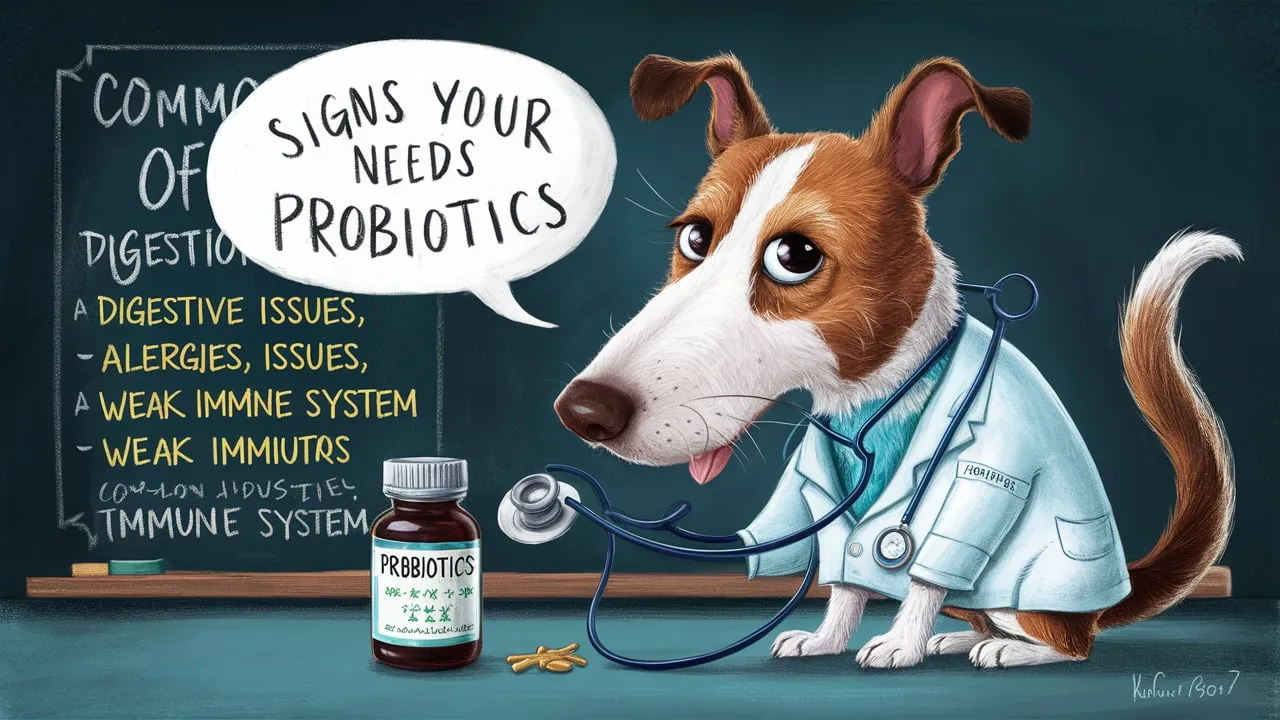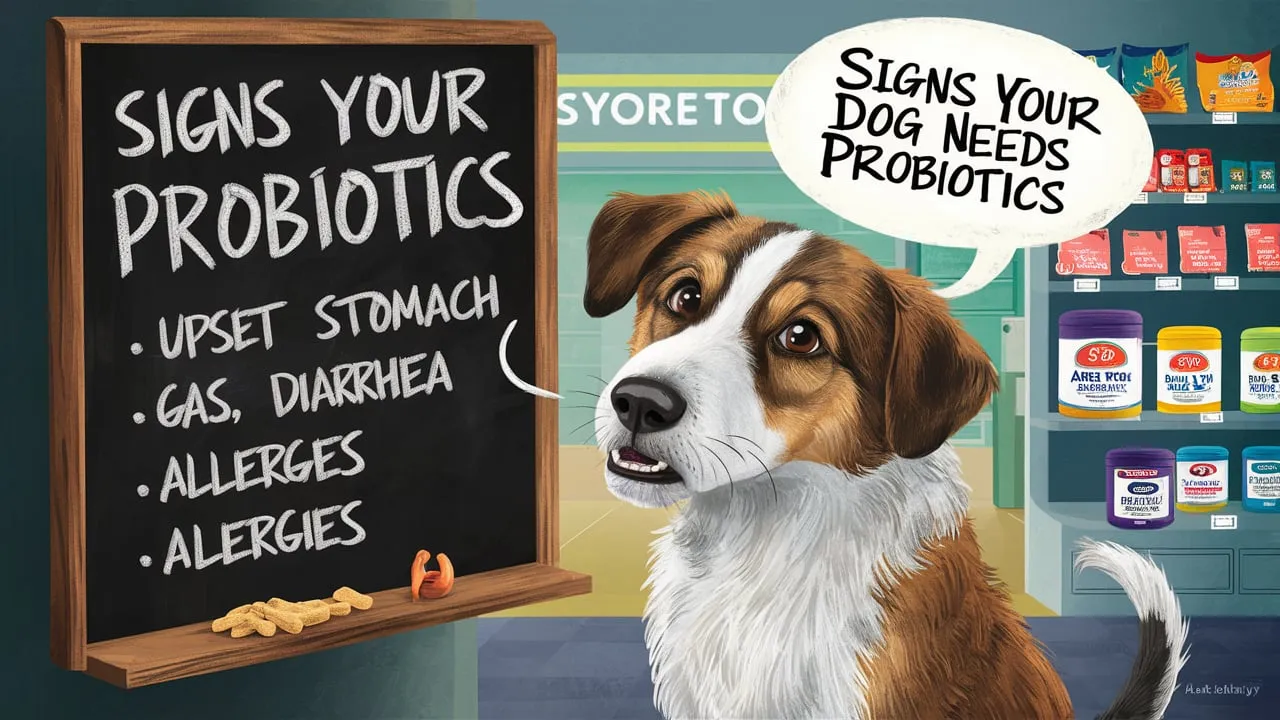Is your dog showing Signs Your Dog Needs Probiotics? These might be indicators that your dog needs probiotics. Probiotics are beneficial bacteria that support gut health and boost the immune system.
In this article, Dogs Infor will cover the key signs your dog may benefit from probiotics and how they can make a difference.
The Importance of a Healthy Gut Microbiome
Dogs have a complex ecosystem of bacteria living in their digestive tract, known as the gut microbiome. This intricate community of microorganisms plays a vital role in their overall health and well-being.
The Role of Gut Bacteria in Dog Health
- Digestion: Gut bacteria help break down food, extract nutrients, and promote efficient digestion.
- Immune System: A healthy gut microbiome supports a strong immune system by preventing harmful bacteria from colonizing the digestive tract.
- Nutrient Absorption: Gut bacteria aid in the absorption of essential vitamins and minerals.
- Mental Health: Emerging research suggests a connection between gut health and mental well-being in dogs, potentially influencing behavior and mood.
How Probiotics Support Digestive Function?
- Beneficial Bacteria: Probiotics are live microorganisms that, when consumed in adequate amounts, provide health benefits. They help replenish and balance the gut microbiome.
- Improved Digestion: Probiotics can improve digestion, reduce gas and bloating, and promote regular bowel movements.
- Reduced Diarrhea: They can help reduce the incidence and severity of diarrhea, especially in dogs with digestive issues.
The Benefits of a Balanced Gut Microbiome
- Enhanced Immune Function: A balanced gut microbiome strengthens the immune system, making dogs less susceptible to infections and illnesses.
- Improved Digestion and Nutrient Absorption: Leads to better digestion, nutrient absorption, and overall health.
- Reduced Allergies and Skin Problems: A healthy gut microbiome can contribute to improved skin and coat health, potentially reducing allergies and skin problems.
- Improved Behavior and Mood: There’s growing evidence suggesting a link between gut health and mental well-being, potentially impacting behavior and mood.

Signs Your Dog May Need Probiotics
While a balanced diet and healthy lifestyle are crucial for maintaining a thriving gut microbiome, some dogs might benefit from additional support through probiotics. Here are some signs that your dog might need a probiotic boost:
Digestive Issues: Diarrhea, Constipation, Gas
- Diarrhea: Frequent loose stools, especially if accompanied by other symptoms like vomiting or lethargy.
- Constipation: Difficulty passing stools, straining, or infrequent bowel movements.
- Gas: Excessive flatulence, bloating, or abdominal discomfort.
Food Allergies and Sensitivities
- Skin Problems: Itchy skin, rashes, hot spots, or hair loss.
- Digestive Upset: Vomiting, diarrhea, or gas after eating certain foods.
- Behavioral Changes: Restlessness, scratching, or licking excessively.
Immune System Weakness
- Frequent Infections: Recurring ear infections, skin infections, or urinary tract infections.
- Slow Healing: Wounds or injuries that take longer than usual to heal.
- Lethargy: Lack of energy, decreased activity levels, or general malaise.
Skin and Coat Problems
- Dull Coat: A dull, dry, or lifeless coat.
- Excessive Shedding: More shedding than usual.
- Skin Irritation: Redness, itching, or flaking.
Behavioral Changes
- Anxiety: Increased anxiety, nervousness, or restlessness.
- Aggression: Increased aggression or irritability.
- Depression: Lethargy, lack of interest in play, or changes in appetite.

Choosing the Right Probiotic for Your Dog
With the growing awareness of the importance of gut health, there’s a wide array of probiotic options available for dogs. Choosing the right one for your furry friend is essential to ensure they receive the maximum benefit.
Factors to Consider When Selecting a Probiotic
- Dog’s Age and Health: Consider your dog’s age, breed, health condition, and any specific dietary needs.
- Probiotic Strains: Look for probiotics containing strains that are specifically beneficial for dogs, such as Lactobacillus acidophilus, Bifidobacterium animalis, and Bacillus subtilis.
- CFU Count: CFU (Colony Forming Units) indicates the number of live bacteria in a probiotic supplement. Choose a product with a high CFU count, typically in the range of 1-10 billion CFUs.
- Quality and Ingredients: Opt for high-quality probiotics made with human-grade ingredients and free from fillers or artificial additives.
- Storage and Shelf Life: Ensure the probiotic is stored properly to maintain its effectiveness, and check the expiration date.
Types of Probiotic Strains
- Lactobacillus acidophilus: Promotes digestive health and immune function.
- Bifidobacterium animalis: Supports gut health and nutrient absorption.
- Bacillus subtilis: A spore-forming bacteria that can survive harsh stomach acid and reach the intestines.
Dosage and Administration
- Follow Product Instructions: Always follow the dosage instructions provided by the manufacturer.
- Mix with Food: Most probiotics are easy to administer by mixing them with your dog’s food.
- Consistency is Key: For optimal results, administer probiotics consistently over time.
Consulting Your Veterinarian
- Personalized Recommendations: Consult your veterinarian for personalized recommendations based on your dog’s specific needs.
- Potential Interactions: Your veterinarian can ensure the probiotic won’t interact with any medications your dog is taking.
- Monitoring Progress: Your veterinarian can monitor your dog’s progress and adjust the probiotic dosage or type as needed.
Conclusion
Probiotics can play a significant role in maintaining and improving your dog’s health. By recognizing the signs that your dog might need probiotics and understanding how to introduce and monitor them, you can help your furry friend live a healthier, happier life. Always consult with your veterinarian before making any changes to your dog’s diet or supplement regimen.

Related Post
Green Stool In Dogs: Causes, Concerns And When To Worry
Dental Anatomy Of Dogs: Unveiling The Secrets
Dog Periodontal Disease Stages: Understanding Dog’s Health